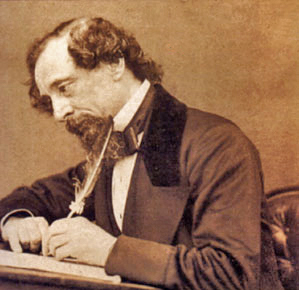In some ways, it is extremely difficult to pin down what makes Charles Dickens (1812-1870) a great writer. With a career than ran from 1836 to 1870, from Sketches by Boz to the unfinished novel The Mystery of Edwin Drood, Dickens is the acknowledged master of the Victorian novel, sometimes considered second only to Shakespeare among the ranks of English language authors. But what makes him great? Why did he transcend his own century and find his way into so many aspects of contemporary popular culture?
As a way of perhaps narrowing the field, let us consider, for a moment, what weaknesses one might find in Dickens.
First of all, we might acknowledge his tendency to rely on coincidence. For instance, Oliver Twist ends entirely too neatly (but we wouldn't dream of giving it away). Also, Dickens' more sentimental aspects have not aged well. Of The Old Curiosity Shop, Oscar Wilde quipped, 'One would have to have a heart of stone to read the death of little Nell without dissolving into tears…of laughter.' Dickens also has an unfortunate tendency to write very good, very beautiful, very dull heroines: Agnes in David Copperfield or Ada in Bleak House, for example.
But Dickens can be forgiven a million times over for these faults because he does so many of the novelist's tasks so well. Let us take up the question of his female characters again. Yes, Ada and Agnes may have little to recommend them, but what about the eminently sinister Miss Havisham or the tormented Lady Dedlock or Madame Defarge, knitting away as the guillotine comes down? Dickens is a master of many characters: heroes, villains, comic and satirical figures.
He could also paint a scene like no one else: the fog at the beginning of Bleak House, the marshes in Great Expectations with the hulks looming in the distance. Tolstoy considered Chapter 55 of David Copperfield ('Tempest') to be that by which all other fiction should be measured.
I could go on. One might consider Dickens' engagement with social issues - the plight of the London poor, the terrible machinery of the courts - or his delineation of universal human experience - growing up, falling in love, discovering one's calling in life. One might also cite his undeniable skill for telling a good story and for exploiting the serialized publication of his novels to keep his readers longing to know what would happen next week or next month. Dickens delved into the great matters of his day, while also appealing to universal human emotions and experience, all of which continue to make his writing utterly readable to this day and into the future.
Which is your favourite Dickens novel? My vote goes to Great Expectations.
For another take on Dickens' status as a great writer, please listen to Robert Douglas-Fairhurst's podcast 'Why Dickens? or his more recent recording, "Why should we study Dickens?
Other popular works such as Nicholas Nickleby and A Tale of Two Cities are available online as free eBooks.
You are here
Charles Dickens: Master Storyteller
Please help us improve with this one minute survey (opens in a new tab)
By:
Date Published: 19 April 2012
In Collection(s): Charles Dickens
Reuse this essay: Download PDF Version | Printer-friendly Version

